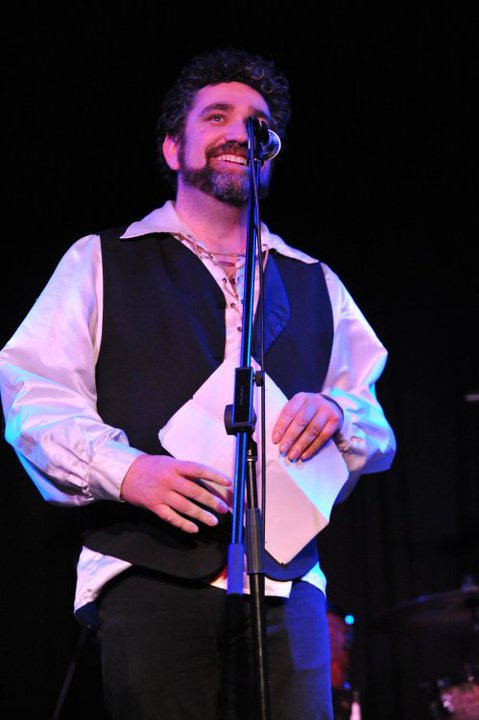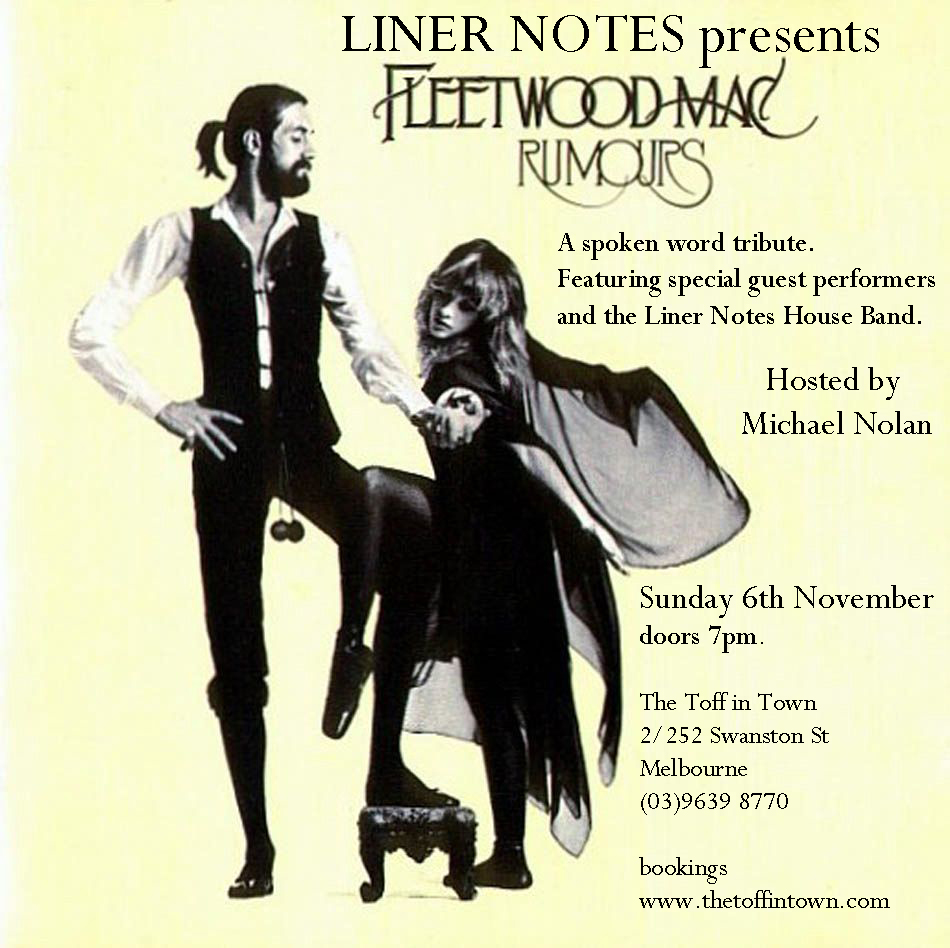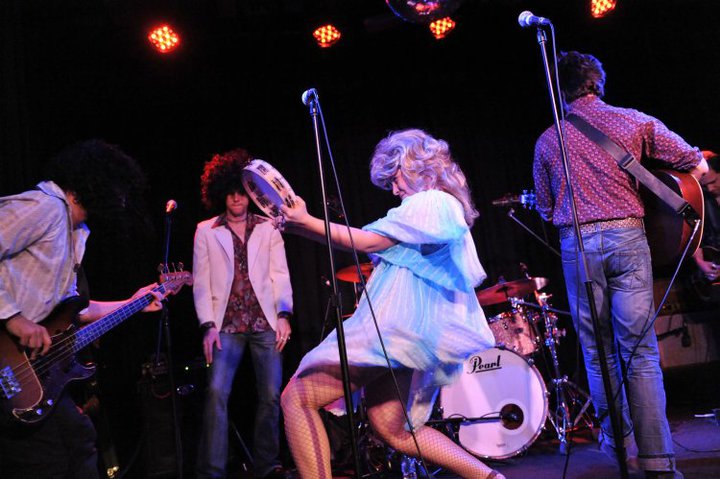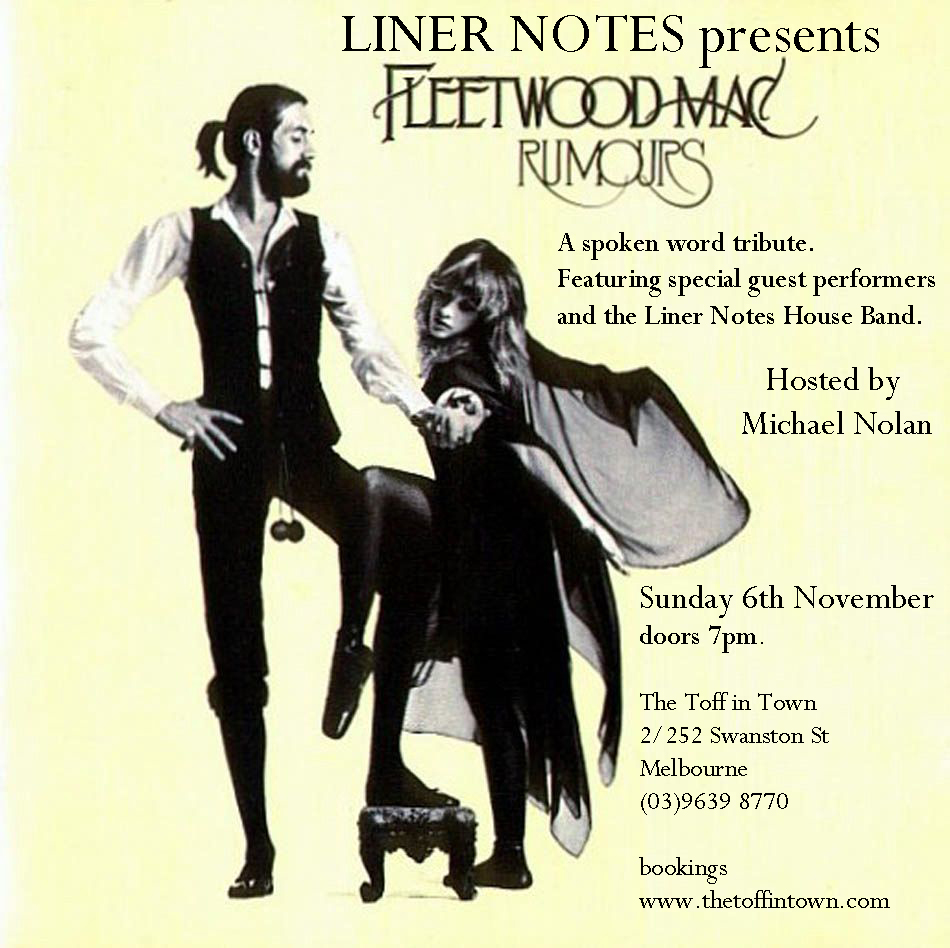|
Fleetwood Mac back at The ToffMelbourne celebrates Nicksvember!– Special Encore Performance –The much-loved literary cabaret Liner Notes storms back to The Toff for a special encore performance of their tribute to that masterpiece of middle-of-the-road, Fleetwood Mac’s Rumours. Coinciding with the imminent return to Melbourne of Stevie Nicks herself, this is a chance to make it a Nicksvember to remember, starting with the Liner Notes spoken word spectacular.
 Fresh from their sold-out event dedicated to INXS’s Kick at the Melbourne Writers Festival, Liner Notes are regathering a stellar cast to revisit the 1977 Fleetwood Mac classic. Special guests Lawrence Leung, Cate Kennedy and Carrie Rudzinski (US) will join Emilie Zoey Baker, Sean M Whelan, Alicia Sometimes, Ben Pobjie, Omar Musa, Josh Earl, George Dunford, Eva Johansen and host Michael Nolan to poetically re-interpret Rumours, track by track.
1. ‘Second Hand News’ JOSH EARL
2. ‘Dreams’ CARRIE RUDZINSKI
3. ‘Never Going Back Again’ ALICIA SOMETIMES
4. ‘Don't Stop’ LAWRENCE LEUNG
5. ‘Go Your Own Way’ EMILIE ZOEY BAKER
6. ‘Songbird’ GEORGE DUNFORD
Side two 7. ‘The Chain’ CATE KENNEDY 8. ‘You Make Loving Fun’ BEN POBJIE 9. ‘I Don't Want to Know’ SEAN M WHELAN 10. ‘Oh Daddy’ EVA JOHANSEN 11. ‘Gold Dust Woman’ OMAR MUSA  In the late ‘70s, to what use could hirsute chests and permed ‘fros, flowing gold locks and wispy lace, drug binges and three marital break-ups be put, other than to take too long to record the greatest AOR album of all time? Fleetwood Mac’s Rumours is the quintessential overblown masterpiece, where the money spent on getting the hi-hat sound just right could have fed millions.With a brilliant live band ripping through the likes of Go Your Own Way and The Chain, and a line-up of exciting guests joining some of Melbourne’s finest spoken word performers and comedians, Liner Notes: Rumours had a sell-out crowd in raptures at last year’s Writers Festival – this encore performance is a chance to see what all the tweeting fuss is about.Tule, top hats and tambourines at the Toff! Don’t stop thinking about tomorrow – it’ll soon be here!
In the late ‘70s, to what use could hirsute chests and permed ‘fros, flowing gold locks and wispy lace, drug binges and three marital break-ups be put, other than to take too long to record the greatest AOR album of all time? Fleetwood Mac’s Rumours is the quintessential overblown masterpiece, where the money spent on getting the hi-hat sound just right could have fed millions.With a brilliant live band ripping through the likes of Go Your Own Way and The Chain, and a line-up of exciting guests joining some of Melbourne’s finest spoken word performers and comedians, Liner Notes: Rumours had a sell-out crowd in raptures at last year’s Writers Festival – this encore performance is a chance to see what all the tweeting fuss is about.Tule, top hats and tambourines at the Toff! Don’t stop thinking about tomorrow – it’ll soon be here!Liner Notes: Rumours
Sunday 6 November
7.30pm
Toff in Town, Deakin House, Swanston St
Tickets $18.00 + $3.30 BF = $21.30 online presales / $20.00 on the door
Buy em here!
http://www.moshtix.com.au/Event.aspx?id=51179&pLock&vip&skin&ref
|
My Wheeler Centre talk is live!
My Lunchbox/soapbox talk at The Wheeler Centre for Books Writing and Ideas is live online, gonna work on my Bantick impression... http://wheelercentre.com/static/scripts/flowplayer.commercial-3.2.1.swf
 Here are some of the videos I mentioned in the talk
Here are some of the videos I mentioned in the talk
Taylor Mali's What Teachers make (now up to 3,207,495 views)
[youtube=http://www.youtube.com/watch?v=RxsOVK4syxU]
Andrea Gibson's Birthday
[youtube=http://www.youtube.com/watch?v=nvaV6h2r4-o]
Saul Williams Black Stacey
[youtube=http://www.youtube.com/watch?v=4QnkrMA0wXQ]
Omar Musa, My Generation
[youtube=http://www.youtube.com/watch?v=_DtscGNZxn4]
and this, I didn't mention it but it's so damn good, Gil Scott Heron, The Revolution Will Not Be Televised
[youtube=http://www.youtube.com/watch?v=rGaRtqrlGy8]
This is a link to more information about Out Loud The Teen Team Poetry Slam
And this will take you to The Super Poets main page
Christopher Bantick Responds to my ideas...
As a result of the article in The Age (see below) Christopher Bantick wrote this 'response' in The Australian. I have since given a talk in 'response' to this article at The Wheeler Centre for books writing & ideas during the Lunchbox/Soapbox series as well as delivering the same talk at The National Australian Poetry Symposium just a few days ago. I will publish the full transcript here shortly, but for a lookie of the talk you can watch the live stream of the Symposium here for part 1 and here for part two...Only greatness, not popular appeal, can restore poetry as the nation's memory
IN case you didn't know, Australian performance poet Emilie Zoey Baker is the international poetry slam champion. Slam is a form of spoken-word performance and competition. But to assume that slam is poetry is enough to make the muse mute
Still, it's not Baker's slam success we should be worried about. It is her suggestion that poetry should be on prime-time television and replace programs such as MasterChef. What Baker and her fellow versifiers have failed to understand is that celebrity poets do more harm than good.
According to Baker, poetry needs to be slammed into us: "I would love it to be on prime-time television. It is such a fantastic way to get into people's lounge rooms. Imagine having your soul unravelled like a ribbon at 7.30 on Thursday night, rather than learning the contents of Matt Preston's stomach."
Whether you like MasterChef isn't the point here. The Baker vision of a show, perhaps So You Think You're a Poet or Master Poet, is about celebrity, impact and not a lot more. But poetry will not regain its place in the national conscience by our reducing it to a public mosh pit.
Those who know what great poetry is covet its place in the culture. Pop poems may pull the punters to pubs, but that's all.
In the same week that Baker was awarded her slam title, arguably one of Australia's finest living poets, Christopher Wallace Crabbe, was awarded an Order of Australia. This was, so the citation noted, "For service to the arts as a leading poet, critic and educator."
What needs to be grasped is that not all poetry has the capacity to move us. Great poetry does. To this end, American poet Randall Jarrell was right when he said: "A good poet is someone who manages, in a lifetime of standing out in thunderstorms, to be struck by lightning five or six times."
In his 1996 Boyer lectures, The View from the Bridge: Aspects of Culture, Pierre Ryckmans observed: "That a man may survive for quite a while without food, but cannot live one day without poetry, is a notion ... we tend to dismiss too lightly, as a sort of 19th-century romantic hyperbole."
How can we explain that, when the new app for T.S. Eliot's The Waste Land - which had Eliot reading the poem - was, according to the eBookNewser site, "The top-grossing iPad book app in the Apple App Store," earlier this month? What this tells us is that great poems live and last.
Poets such as Baker who want to give us wham and slam need to face this reality. Their poetry depends on personality pyrotechnics, but as poetry it does not scan. Good poetry takes time to understand. It takes emotional and intellectual investment. The buy-in is something more enduring than a bright flare of words.
This goes some way to explain why, on a wet and miserable June night, the University of Melbourne's Newman College oratory hall was packed as people came to listen to Peter Steele read and reflect on his verse. It was an evening of illumination and edification, but there were few young people. Part of this is due to education - even so, I defy any spotty 16-year-old not to be arrested by Sylvia Plath reading her poem Daddy - but part of it is also due to the poverty of the poetry post-baby boomers know. Gens X and Y are impoverished and have no storehouse of verse to call on.
The art of committing great poems to memory is lost. Whether one likes A.B. "Banjo" Paterson's The Man from Snowy River is immaterial. Many of us can recite the first verse at least. After the devastation of floods and fire this past summer, Dorothea Mackellar's My Country was suddenly entirely apt with her references to "flood and fire and famine". But who knew it?
There is more than a passing truth in the acerbic comment by poet Bruce Dawe in his essay Recent Trends in Australian Poetry. He notes: "If our poetry is indicative of the life-force of our country, then we're moribund."
What has been lost is the place of poetry in national memory. While Dawe may say that the Henry Lawson and Paterson bush tradition's "creek bed's panned out", where is the wellspring of our knowing the verse of James McAuley, A.D. Hope, Judith Wright and Les Murray, among others?
The loss of a once vibrant oral tradition of knowing poems in the heart, and not just by heart, has been devalued. Indigenous Australians can tell us much about the importance of knowing the song lines of a culture. Yes, it's education's role, but also a cultural responsibility.
Why should we know great poems? They can be a comfort and inspiration, not to mention sustaining when we hunger for meaning and solace.
Christopher Bantick is a Melbourne writer and senior English teacher at Trinity Grammar, Kew.







